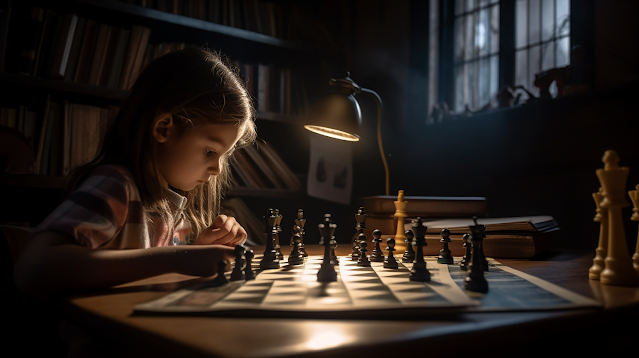How to Navigate the Dark Arts of Chess: A Deep Dive into Psyche-Bending Tactics Introduction Chess, the age-old battle of wits, isn't me...
How to Navigate the Dark Arts of Chess: A Deep Dive into Psyche-Bending Tactics
Introduction
Chess, the age-old battle of wits, isn't merely about moving pieces on a board; it's a psychological battlefield where mental strategies often outshine physical prowess. Imagine a world where Gandalf-like grandpas hum distracting tunes, opponents kick under the table, and players wage psychological warfare as fierce as the chessboard itself. Welcome to the intriguing realm of psychological warfare in chess! 🌟
The XVI Century's Mind Games
In the 16th century, Ruy Lopez de Segura made one of the earliest mentions of psychological warfare in chess. He suggested placing the chessboard so that sunlight would annoy your opponent by shining into their eyes—a clever tactic to disrupt concentration.
The Symphony of Distraction
Humming and Singing: In casual games, opponents might serenade you with distracting melodies, driving your focus into chaos. There's even a tale of a wizard-like grandpa whose incessant singing was maddening!
Finger Drumming: Nervous energy finds expression in finger drumming, a subtle yet potent form of distraction.
Clock Shenanigans: Some sly players hold onto the chess clock after their move, stealing precious seconds in blitz games. It's a foul play, of course, but it happens.
Harassment Knows No Bounds: Psychological warfare can delve into uncomfortable territories like gender, race, age, or playing strength. Be prepared for anything.
Pre-Game Mind Games
Disrespectful Questions: Provocative questions before the game, like "What color am I?" or "How do you spell your name?" aim to rattle opponents, suggesting indifference.
The Name Tag Trick: In Qatar Masters 2014, Vladimir Kramnik checked his opponents' name tags before the round, and it backfired amusingly as Anish Giri used the same trick and won!
Under-the-Table Kicks: In a Candidates match in 1974, Viktor Korchnoi received infamous under-the-table kicks.
The Handshake Snub: Anatoly Karpov refused to shake hands with Viktor Korchnoi in the World Championship match in 1978. The drama unfolded as the Chief Arbiter got involved.
The Power of the Stare
Intimidating Stares: Staring directly at your opponent during their move is a tactic that conveys hostility, a psychological test of nerve.
Disorder on the Board
Sloppy Piece Placement: Placing pieces haphazardly or accidentally knocking them down is a form of subtle agitation.
Hovering Presence: Standing behind your opponent as they ponder their moves can be profoundly unsettling.
Smoking Battles
Smoking Over the Board: Smoking was once a common habit during matches but got officially banned in chess events. Legends like Mikhail Tal were inseparable from their cigarettes.
The Unusual Moves
Write Before You Move: Writing a move down before making it can irritate opponents by hinting at your intentions.
Outlandish Outfits: Sporting eccentric clothing choices, like Nona Gaprindashili's legendary preference for fashion, can be a distraction.
Audible Munching: Some players munch loudly at the board, breaching FIDE rules.
Late Arrivals: Arriving late for a game, a classic nervous maneuver, introduces uncertainty.
Silent Conspiracies: Conversations with friends during a game can make opponents suspicious about secret strategy discussions.
Hypnotizers and Mind Games
Hypnotic Impressions: In the days of Korchnoi, Karpov, and Kasparov, hypnotists often played mind games to disrupt concentration.
A Battle of Endurance
Refusing Draws: Stubbornly playing on in drawn positions to exhaust opponents emotionally is a common tactic.
Aggressive Board Handling: Aggressively moving pieces or slamming doors can destabilize opponents. Vishy Anand's tale of Kasparov's door-slamming in the 1995 World Championship is legendary.
The Dark Art of Screwing
Screwing Pieces: Twisting pieces into the chessboard signifies a game-changing move.
"J'Adoube" Repetition: Constantly adjusting pieces and saying "J'Adoube" can be irritatingly distracting.
Conclusion: The Chess of the Mind
Psychological warfare in chess is a fascinating, if sometimes unsettling, dimension of the game. While these tactics may raise eyebrows, they're part of chess's rich history. As Bobby Fischer wisely said, "I don't believe in psychology. I believe in good moves." Ultimately, it's the quality of your moves and the strength of your mind that prevails on the checkered battlefield. So, ready your knights, queens, and psychological resilience, and step into the arena where minds clash as fiercely as armies. 🧠♟️











No comments